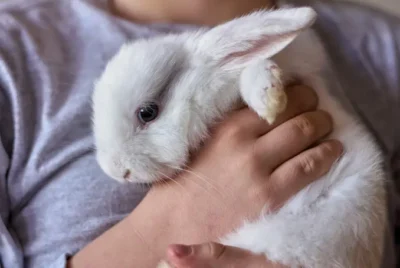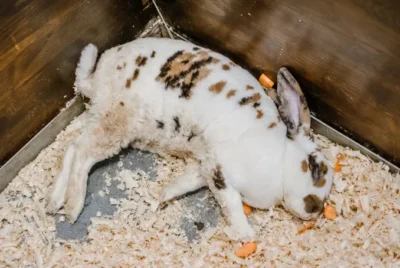What to Do if Your Rabbit Has Overgrown Teeth
Is your beloved rabbit showing signs of discomfort, such as decreased appetite, difficulty eating, or excessive drooling? These could be indications of a painful problem that many rabbit owners face – overgrown teeth.
When your furry friend’s dental health is compromised, it not only affects their quality of life but also raises concerns about their overall well-being. In this article, I will address the pain points associated with overgrown teeth in rabbits and provide you with actionable solutions to ensure your pet’s comfort and happiness.
Understanding Rabbit Teeth Growth
Rabbits, including wild rabbits, have 28 teeth, consisting of incisors, rabbit molars, and rabbit’s teeth, which play a crucial role in their ability to chew and process food. These teeth continually grow as a natural counterbalance to wear resulting from their abrasive diet. A rabbit eats various types of food, including rabbits teeth-friendly options such as:
- grasses
- weeds
- twigs
- roots
However, this continuous growth can sometimes lead to complications, such as overgrown teeth, which can cause dental disease in rabbits and affect their overall health.
Incisors and Molars
Incisors are the front teeth of a rabbit, while molars, also known as cheek teeth, are located at the back of the rabbit’s mouth. Overgrown incisors can become so elongated that they bend and protrude between a rabbit’s lips, possibly penetrating its gums or the roof of its mouth. This can lead to painful wounds and inhibit their ability to consume food.
Overgrown molars, on the other hand, can cause discomfort and difficulty in chewing, as they form sharp edges and points within the rabbit’s mouth. Both incisors and molars require proper care and attention to prevent overgrowth and maintain your rabbit’s overall dental health.
Continuous Growth
Rabbit teeth grow continuously as a countermeasure to the wear induced by their abrasive diet. In fact, the average growth rate of rabbit teeth is approximately 1.9 mm per week for maxillary incisors and 2.2 mm per week for mandibular incisors, while the growth rate for molars is around 2.14 mm per week. This continuous growth ensures that their teeth remain functional throughout their lives, enabling them to break down fibrous vegetation.
Unmanaged growth, however, can result in overgrowth, bringing about complications and discomfort to your pet. Hence, being aware of why their teeth continually grow and how to manage it is vital for rabbit owners.

Identifying Overgrown Teeth in Rabbits
In a rabbit, overgrown teeth can trigger a multitude of problems including difficulty in chewing, drooling, weight loss, among other serious repercussions. Early detection can help avert these complications and bolster your rabbit’s overall wellbeing.
Common Signs and Symptoms
Some common signs of overgrown teeth in rabbits include difficulty eating, droppings from the mouth, and molar root impaction.
Molar root impaction can cause various symptoms, ranging from a weeping eye to a tooth root abscess or gut stasis.
Other potential symptoms associated with overgrown teeth may include salivation, matted fur on the inside of their front legs, cuts or damage to the tongue, cheeks, or gums, weight loss, difficulty grooming, diarrhea or soft feces, weepy eyes, drooling, and reduced appetite.
Treatment Options for Overgrown Rabbit Teeth
Treating overgrown rabbit teeth involves trimming or removal, depending on the severity and location of the overgrowth. I recommend always consulting a veterinarian for diagnosis and treatment as they are the best placed to evaluate the condition of your rabbit’s teeth and suggest a suitable course of action. Moreover, it is important to note that rabbits have unique dental anatomy.
Trimming Incisors
Trimming overgrown incisors can be done through painless teeth-trimmed methods using two common approaches: trimming and removal. To ensure the safety and comfort of your rabbit during the procedure, I advise having a veterinarian perform the trimming using the necessary equipment, such as nail clippers or a dental burr.
Post-trimming, keep a close eye on your rabbit for any signs of distress or eating difficulties and provide soft, easily chewable foods to facilitate comfortable eating. Maintain a regular inspection of your rabbit’s teeth to check they are growing appropriately and not getting overgrown again.
Managing Overgrown Molars
Managing overgrown molars requires veterinary diagnosis, sedation, and a dental bur or tooth file. The rationale for sedation when managing overgrown molars in rabbits is that it enables veterinarians to trim the teeth without risking injury to the rabbit or causing discomfort.
In cases of severe overgrowth, surgery may be required to rectify the issue. Regular check-ups and monitoring of your rabbit’s dental health are crucial to prevent complications arising from overgrown molars.

Preventing Overgrown Teeth in Rabbits
Diet and Nutrition
Supplying rabbits with fibrous foods such as timothy hay and leafy greens aids in preventing teeth overgrowth by encouraging chewing and wear of the teeth. A rabbit’s diet plays a significant role in its dental health, as inadequate nutrition or a low-fiber diet can cause dental disease and overgrown teeth.
To uphold your rabbit’s dental health and avoid overgrown molars, a diet consisting of 80% hay is advisable. A well-balanced, high-fiber diet is crucial for your rabbit’s overall health and wellbeing.
Chew Toys and Enrichment
Providing safe, non-dietary items for rabbits to chew on, such as wood blocks and wicker baskets, can also help maintain dental health. Chewing on toys assists in wearing down their teeth and stimulates the rabbit.
I highly suggest choosing wood that is untreated and pesticide-free to ensure the safety of your rabbit. Offering a variety of chew toys and enrichment activities can help maintain your rabbit’s dental health and satisfy their natural urge to chew.
Read also: Dental Disease in Rabbits: Types, Causes and Treatments

Caring for Your Rabbit’s Overall Dental Health
Routine monitoring and dental care are vital to sustain your rabbit’s overall dental health. By ensuring proper care of your rabbit’s incisors and molars, you can prevent complications arising from overgrown teeth and keep your furry friend healthy and happy.
Monitoring Teeth Growth
Dental Care Routine
The establishment of a dental care routine, encompassing frequent check-ups and vigilance for changes in teeth, can help in maintaining your rabbit’s dental health. Periodic examination by a veterinarian facilitates the early detection of dental disease, allowing for successful treatment and prevention of further complications.
In addition to providing a high-fiber diet and chew toys, it is crucial to inspect your rabbit’s teeth regularly and seek veterinary advice if you notice any signs of dental issues, such as drooling, weight loss, or reluctance to eat.
Summary
Addressing overgrown teeth in rabbits is a vital aspect of responsible rabbit ownership. Remember that regular veterinary check-ups are crucial for monitoring your rabbit’s dental health and overall wellness. With proper attention and care, you can help your rabbit maintain healthy teeth and enjoy a happy, pain-free life.




